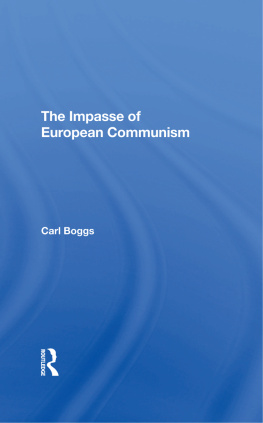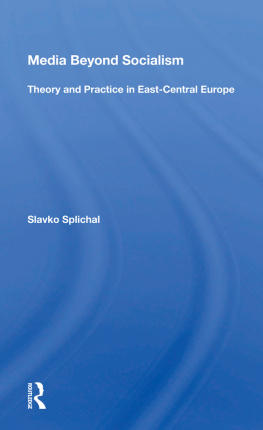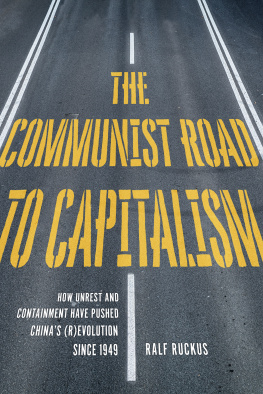The Impasse of European Communism
Also of Interest
Communism and Political Systems in Western Europe, edited by David E. Albright
The Euro-American System: Economic and Political Relations Between North America and Western Europe, edited by Ernst-Otto Czempiel and Dankwart A. Rustow
The Foreign Policies of the French Left, edited by Simon Serfty
Ideology and Politics: The Socialist Party of France, George A. Codding, Jr., and William Safran
Social Structure in Italy: Crisis of a System, Sabino Acquaviva and Mario Santuccio
The Spanish Political System: Franco's Legacy, E. Ramn Arango
Marxism in the Contemporary West, edited by Charles F. Elliott and Carl A. Linden
The Unfinished Revolution: Marxism and Communism in the Modern World, revised edition, Adam B. Ulam
History of the International: World Socialism 1943-1968, Julius Braunthal
Innovation in Communist Systems, edited by Andrew Gyorgy and James A. Kuhlman
Fascism in the Contemporary World: Ideology, Evolution, Resurgence, Anthony James Joes
Worker Participation and the Crisis of Liberal Democracy, Sherri DeWitt
The Socialist Industrial State: To ward a Political Sociology of State Socialism, David Lane
Theories of Comparative Politics: The Search for a Paradigm, Ronald H . Chilcote
The Letters of Rosa Luxemburg, edited and translated by Stephen Eric Bronner
Available in hardcover and paperback.
About the Book and Author
The Impasse of European Communism Carl Boggs
The major Communist parties in Western Europe claim a commitment to a "democratic road to socialism." Often this is a genuine evolution of traditional Marxist/Leninist ideology based on the assumption that political and economic power can be obtained through gradual change rather than revolution and through the utilization of democratic processes. How well is this strategy working? Not very well, concludes the author of this book.
Carl Boggs bases his analysis on a theoretical assessment of the historical and strategic development of Eurocommunism of those par ties and movements (notably in France, Italy, and Spain) that seek a transition to socialism based on the democratization of existing political and economic structures (the so-called parliamentary road to socialism). After examining the logic and premises of this conception, he moves to a critique of the major Eurocommunist theoreticianse. g., Togliatti, Berlinguer, Ingrao, Napolitano, Carrillo, Marchais, Elleinstein, Poulantzas, and Claudin. He concludes that their ideas fail to resolve the historic Marxist conflict between democratization and rationalization (understood here in terms of the drive toward statism, bureaucratization, and further refinement of the social division of labor under capitalism). In fact, says Dr. Boggs, Eurocommunism will probably represent a sort of historical resolution of legitimation and production crises within Mediterranean capitalism that extends rather than overturns hierarchical social and authority relations, the capitalist state, and the social division of labor. Such a resolution might broadly parallel the function of social democracy in Northern Europe in a previous phase of capitalist development.
Carl Boggs is a visiting professor in the Political Science Department at the University of Southern California. He has also taught at the University of California, Los Angeles, at Washington University, St. Louis, Missouri, and at the University of California, Irvine. Dr. Boggs has conducted field research in Italy and is the author of Gramsci's Marxism.
The Impasse of European Communism
Carl Boggs
First published 1982 by Westview Press, Inc.
Published 2019 by Routledge
52 Vanderbilt Avenue, New York, NY 10017
2 Park Square, Milton Park, Abingdon, Oxon OX14 4RN
Routledge is an imprint of the Taylor & Francis Group, an informa business
Copyright 1982 Taylor & Francis
All rights reserved. No part of this book may be reprinted or reproduced or utilised in any form or by any electronic, mechanical, or other means, now known or hereafter invented, including photocopying and recording, or in any information storage or retrieval system, without permission in writing from the publishers.
Notice:
Product or corporate names may be trademarks or registered trademarks, and are used only for identification and explanation without intent to infringe.
Library of Congress Cataloging in Publication Data
Boggs, Carl.
The impasse of European communism.
Includes bibliographical references and index.
1. CommunismEurope. I. Title.
HX238.5.B63 335.43094 81-22005
AACR2
ISBN 13: 978-0-367-29300-0 (hbk)
To speak of the "impasse" of European Communism in the highly explosive and unpredictable political milieu of the 1980s is to raise questions that go far beyond the analysis of any specific party or regional grouping of parties. Thus, while I have concentrated on the postwar development of the Mediterranean Communist parties, most of the general conclusions presented in the following pages will probably apply to the experience of any advanced capitalist country where mass-based "Marxist" parties or movements are pursuing structural reformist strategies. In a broader sense, the arguments developed in this book can be understood as part of an effort to illuminate what has become a fundamental crisis within Marxist theory itself.
When "Eurocommunism" became a lively media and academic theme in the mid-1970s, the Italian Communist Party (PCI) seemed to be on the verge of entering national government. The political, economic, and even military implications of such a historic event were generally seen as momentous. The PCI could not build upon its stunning electoral victories in the 1975 regional balloting, however, and hence suffered at least a temporary setback in its political march forward. The media response was to proclaim the "death of Eurocommunism"; overnight the parties that had seemed so close to making history were reduced to col lective corpses. In one important respect such proclamations were not only premature but were also grossly insensitive to the very deep economic and social processes that gave rise to that nervous anticipation in the first place. For even if the Italian and French Communist parties were now further removed from national power, the plethora of issues, debates, and circumstances that surrounded the Eurocommunist phenomenon in the 1970s are still very much alive and will no doubt remain so for the indefinite future. Indeed, class conflict in the Mediterra nean has intensified; working-class and popular movements still confront the same strategic choices; the ruling classes are still desperately trying to recover their fragile hegemony; and the Communist parties have scarcely vanished from the political terrain. One could go further: The atmosphere of urgent debate generated by Eurocommunism was connected to an entire tradition of Marxist theoretical and strategic discourse that has its origins in the classic turn-of-the-century exchanges involving Eduard Bernstein, Karl Kautsky, Lenin, and Rosa Luxemburg.
But there is yet another sense in which Eurocommunism could be described as "dead" or more appropriately, stillborn. The very theory and strategy that underlie the Eurocommunist ''third road" (or "democratic Road to Socialism") have been riddled with serious contradic tions from the outset. For reasons I shall elaborate in the text, this ap proach supplies no adequate grounding for socialist transformation in the advanced countries.















